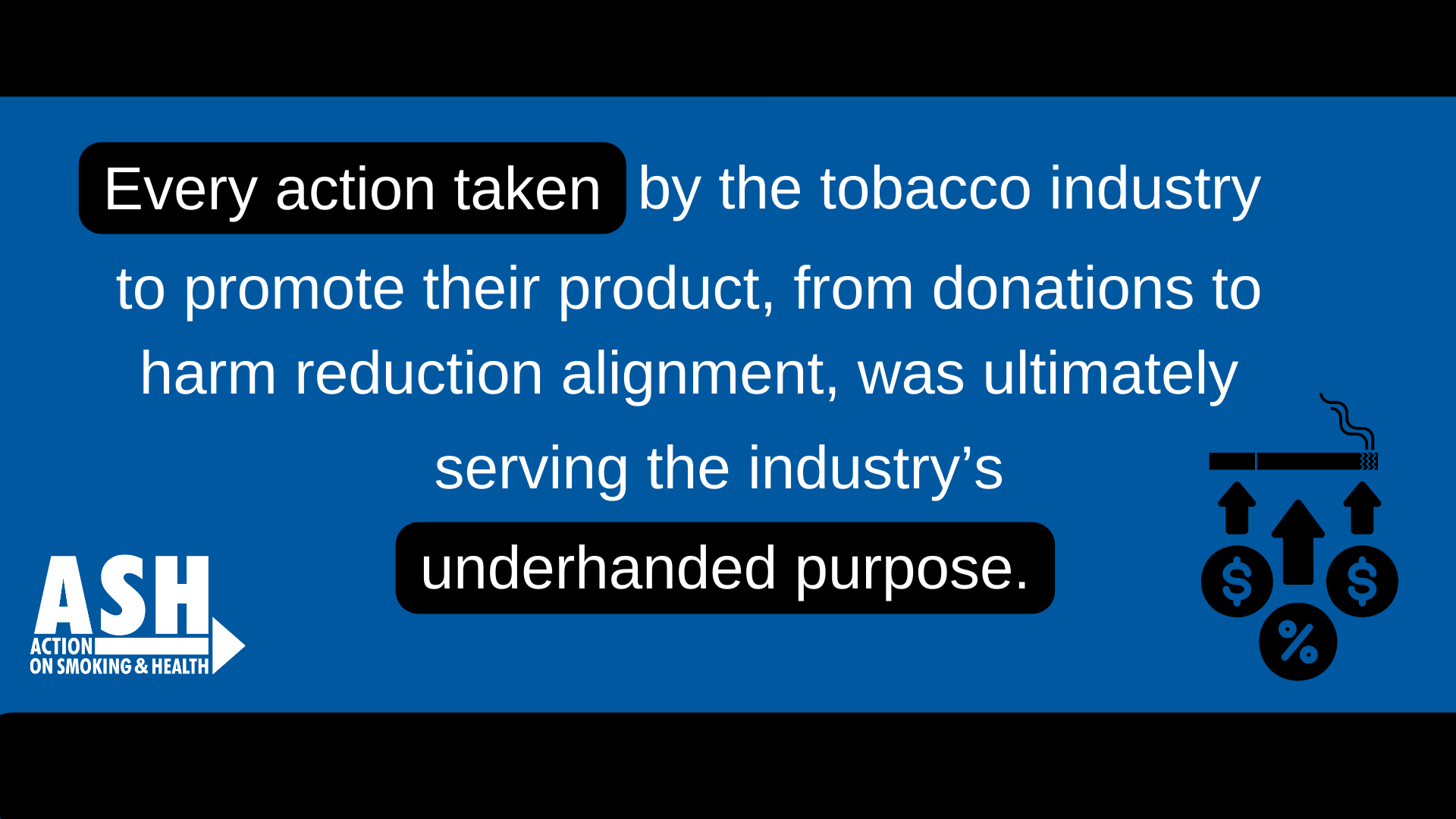Author: Benjamin Verhagen, ASH Policy Intern
June 2023 – the Truth Initiative held a Congressional Briefing and presentation of their “Black Lives/Black Lungs” short films. The films center on the effects of tobacco products, specifically menthol cigarettes, on African American communities over the past several decades. The creator of these films, Lincoln Mondy, spoke before the showing of each film to preface the piece. The films focus on the question: why is menthol so black?
These two insightful and profound films combine personal anecdotes and testimony with a clear message and purpose while being thoroughly engaging. Both films serve as important introductions to the methods by which the tobacco epidemic has been curated to African American communities.
The first film was released in 2017. It highlights the efforts the tobacco industry took to gain a firm grasp on African American communities. From highly targeted advertising campaigns to sponsoring community music events, it was evident that the tobacco industry made a great effort to insert their product into the lives of African Americans.
Under the guises of equality and inclusion, partnerships between community and organization leaders and tobacco industry executives formed. Organizations such as the NAACP and the Congressional Black Caucus Foundation (CBCF) accepted donations from tobacco companies and, with the CBCF, went so far as to distribute menthol cigarettes at their events.
Moreover, “somewhere in the neighborhood of 90% of all African American civil, religious, political, [and] social organizations take money from the tobacco industry,” according to Dr. Phil Gardiner, Founding Member/Co-Chair of the African American Tobacco Control Leadership Council.
A deeper examination of the tobacco industry shows that these contributions to black communities and causes were not altruistic donations but attempts to buy the silence of community leaders and increase the market for their products.
“You can give me everything in the world, but at the end of the day, what is this industry doing? It doesn’t matter how much money you pump into the community. We are worth so much more,” says Julia Osagie, a Student Activist with Truth Initiative.
The second film, “Black Lives / Back Lungs: The Journey of a Stolen Leaf”, dives deeper into the history of tobacco in the U.S. and harm reduction. Separated into five parts, the film begins by highlighting the current efforts underway to ban menthol cigarettes: the proposed ban by the FDA and larger media outlets continuing the discussion around the tobacco industry.
The first part of the film dives into the history of tobacco as a stolen and misappropriated product. Taken from indigenous populations, English colonizers commercialized and debased tobacco. What once was a spiritual tool began to be a poisonous product. The second part is about the transition to e-cigarettes. It reiterates the rise of menthol cigarettes, particularly in the African American community, and the lies the tobacco industry told to cement their products into the culture. E-cigarette companies used those same strategies from decades ago and applied them today. Despite Juul, one of the biggest e-cigarette brands, stating in front of Congress in 2019 that they sought the end of cigarette sales and were opposed to Big Tobacco, Altria, the maker of Marlboro cigarettes, purchased a $12.8 billion stake in Juul.
The film also identifies how Juul and other e-cigarette companies were able to ‘modern-ify’ their products to appeal to a younger market. To portray the e-cigarette devices as the newer, cooler version of the cigarette, the ads drew comparisons to the boombox and the Atari video game consoles. Those were the old-generation devices used decades ago by the parents of this new target audience. The ads read ‘Everything Changes, Eventually’ in an attempt to correlate the technological progression of these products to the transition from cigarettes to e-cigarettes. The fault in that comparison is that products like the boombox and gaming console did not evolve because the product was toxic and harmful, while the cigarette evolved for that reason.
These advertising campaigns affirm what was known about the tobacco industry and its deceptive marketing. Nearly 85% of African American boys ages 12 and older who started smoking menthol cigarettes did so as a result of the targeted ads mentioned in the films (source), and menthol products are cheaper and advertised more in African American communities. (source) This further exemplifies the degree of menthol’s stranglehold over these communities and the need for crucial resources like this film series.
smoking menthol cigarettes did so as a result of the targeted ads mentioned in the films (source), and menthol products are cheaper and advertised more in African American communities. (source) This further exemplifies the degree of menthol’s stranglehold over these communities and the need for crucial resources like this film series.
Another strategy that big tobacco has used and e-cigarette companies adopted that the film covers is funding Black community leaders and spokespeople to speak for them and lie about their products. Juul secured a former head of the NAACP, a board member of the NAACP, and a former civil rights leadership advisor to President Obama and sent millions of dollars to a black medical college, Meharry Medical College. The hirings and donations are attempts to buy legitimacy for the e-cigarette companies and their products.
The film concludes by honing in on a strategy that was started by anti-tobacco and health experts as a means of stopping the consumption of tobacco products: harm reduction. While anti-tobacco advocates created the phrase with an end goal of stopping consumption entirely, the tobacco industry has co-opted the term in an attempt to insert their e-cigarette products as that end goal. For Carol McGruder, another member of the African American Tobacco Control Leadership Council, despite what the tobacco industry has spent billions of dollars trying to convince us of, “e-cigarettes are not the savior for smokers, and we need to quit, we don’t need to switch.”
Congresswoman Alma Adams of North Carolina attended the Congressional Briefing and was mentioned in the first film along with other members of Congress who have been outspoken in their support for anti-tobacco and anti-menthol policies and practices. When Lincoln Mondy opened the floor for questions about the films, Congresswoman Adams shared her experiences. From smoking to learning about not only the physical health concerns of tobacco products but the harms it poses to vulnerable and underprivileged communities, she discussed how the work of Truth Initiative, Moody, and other like-minded organizations have made a considerable impact on her views on tobacco and menthol. It was incredibly inspiring to see how well the impactful message of the films was received in real-time.
Ending menthol sales will address the significant health issues that plague African American communities. With 45,000 Black Americans dying from tobacco-related diseases every year and the leading cause of death for Black Americans being cancer, heart disease, and stroke (source), eliminating a product that is directly connected to these preventable diseases and deaths is a clear step in the right direction.
There is no way to justify continuing the sale of menthol cigarettes.
Lincoln Mondy and the Truth Initiative clearly demonstrate the harm of menthol cigarettes through this brilliant film series. The tobacco industry relies on its consumers taking information at face value. At face value, donating to healthcare institutions and supporting community leaders paints the tobacco industry in a favorable light. How could an industry be predatory of a community that it has helped build? The answer, uncovered and highlighted by Lincoln Mondy and Truth Initiative, is that every action taken by the tobacco industry to promote their product, from donations to harm reduction alignment, was ultimately serving the industry’s underhanded purpose. These films serve as useful advocacy tools and educational campaigns that expose the tobacco industry’s intentions, particularly within African American communities, and will help end the deadly tobacco epidemic.



